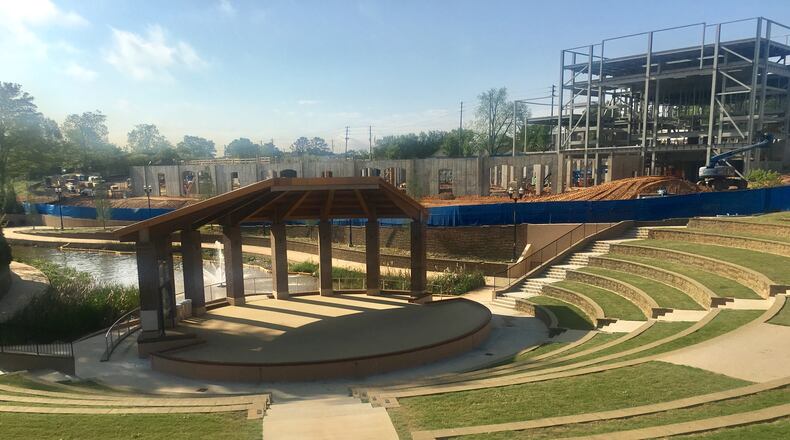The city of Sugar Hill has a not-so-unofficial mantra these days: “Go big or go home.”
And with that in mind, the city will plop down nearly $350,000 this summer to bring big-name musical acts — legendary rock-and-rollers Collective Soul, alternative star Ben Folds and country singer Josh Turner among them — to its cozy municipal amphitheater, the so-called Bowl at Sugar Hill.
The price tag, which will be offset in part by ticket sales and sponsorships, is a hefty one for the northern Gwinnett County city of about 22,000 people.
But the whole “go big” thing isn’t just bravado. It’s part of a grander vision — and a marketing mission.
“We are building a world-class downtown, and branding our community around engagement and entertainment,” Sugar Hill Mayor Steve Edwards said. “Our Bowl is a key part of this branding success.”
Like many of cities in Gwinnett and other Atlanta suburbs, Sugar Hill is at a crossroads, caught between the desire to retain traditional suburban living perks and the thought that, in order to survive and thrive, some sort of modernization is in order.
With that in mind, Sugar Hill opened a gleaming new City Hall building in 2013 and is working feverishly to build up the area around it. Last June, it broke ground on a $36 million project called the E Center, which is slated to feature a 350-seat community theater, a gym, shops, offices and restaurants.
An upscale hotel and conference center are also in the works nearby, as is a separate development planned to include condos and apartments.
Then there’s “The Bowl.”
The 1,600-seat amphitheater is only about five years old but improvements are constantly being made. City officials now call it a “world-class outdoor concert venue” and see it as “the centerpiece” to their redevelopment strategy.
So they’re happy to pay $100,000 for Collective Soul to play there in May, and $65,000 for Ben Folds to play there in September. They’ll gladly fork over another $60,000 for a Josh Turner concert; another $42,000 for KC and The Sunshine Band; another $65,000 for singer-songwriter Boz Scaggs; and another $10,000 for Atlanta Rhythm Section.
Despite the hefty price tags upfront, Edwards figures that, after ticket sales, suite leases and sponsorships, the city will actually pay only $70,000 to host the six concerts.
Even that number might raise a few taxpayer eyebrows, but the handful of people spoken to Thursday as they ran errands or just enjoyed the weather near City Hall didn’t balk.
“Actually, that’s less than I thought,” Jane Murray, who’s lived in Sugar Hill for about three years, said.
“It’s just nice that they have a lot of developments for the people,” Zoya Poveromo, a 14-year resident, said.
Edwards says the concert series — and other efforts like the E Center — have already begun to pique the interest of “real estate folks” and “investors looking to locate [or] build” in the city. He looks as this year’s concert series as an investment “with a return in future years that more than covers the net cost now.”
While Sugar Hill's amphitheater-focused effort may be a fairly novel twist, metro Atlanta cities making the push to create thriving town centers is not a new one. It's been a trend in Gwinnett County for more than a decade, and cities like Suwanee and Lawrenceville have been largely successful in efforts to revitalize their town centers. Duluth and Peachtree Corners are in the middle of major downtown projects.
In Fulton County, the city of Sandy Springs has embarked upon a new town center project with costs approaching $200 million. In Cobb County, Marietta is dreaming of a downtown food hall development reminiscent of Atlanta's Ponce City and Krog Street markets.
Alejandra Thomas, vice president of environmental graphic design at Atlanta-based branding and marketing firm Jones Worley, said using public spaces to try and drive revitalization is “definitely” a trend.
“All kinds of people are investing in public spaces, not only in the way they look to attract visitors and customers and property owners, but also to try to connect the neighborhoods and the culture of the people who use those spaces,” Thomas said.
Murray, the Sugar Hill resident who expected even more to be spent on the upcoming concert series, is glad her city’s getting a piece of the action.
“The town is just exploding,” she said.
About the Author
The Latest
Featured





